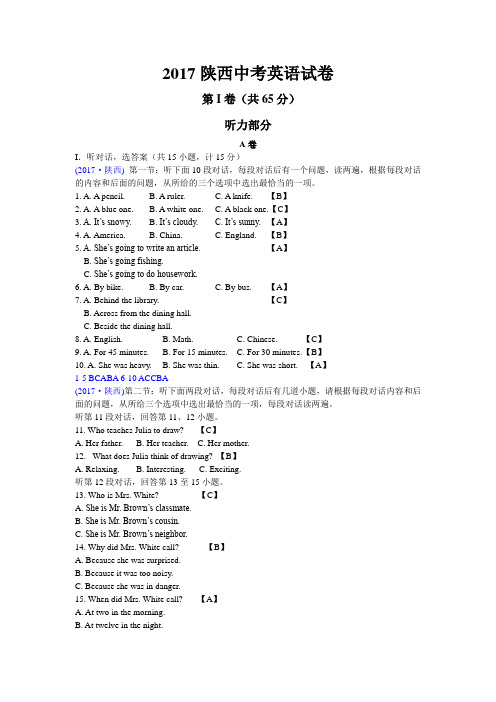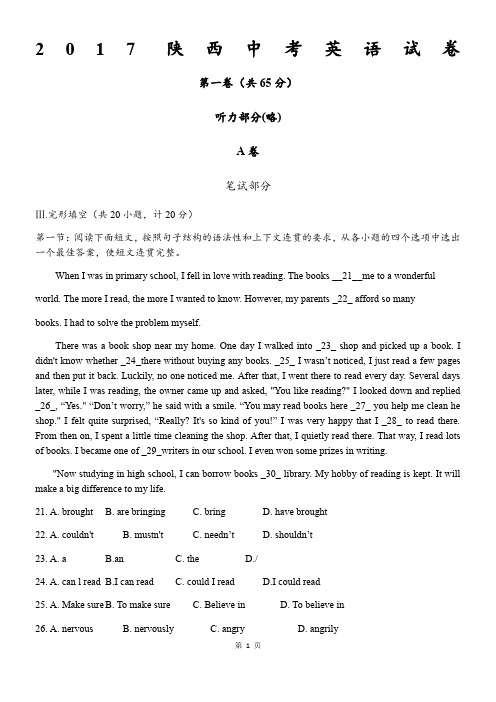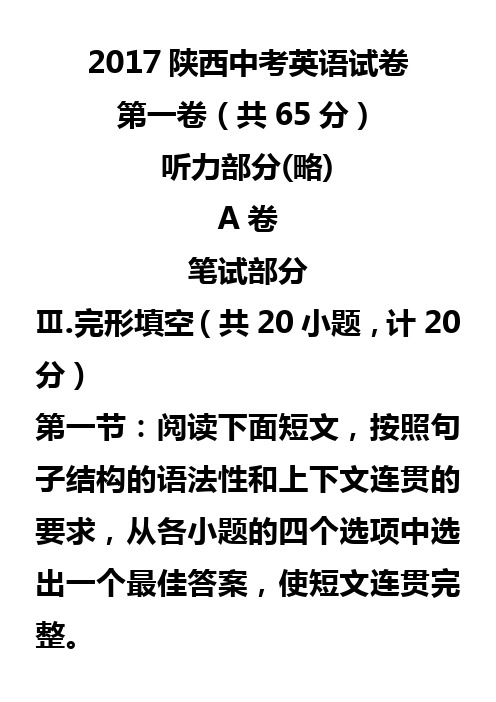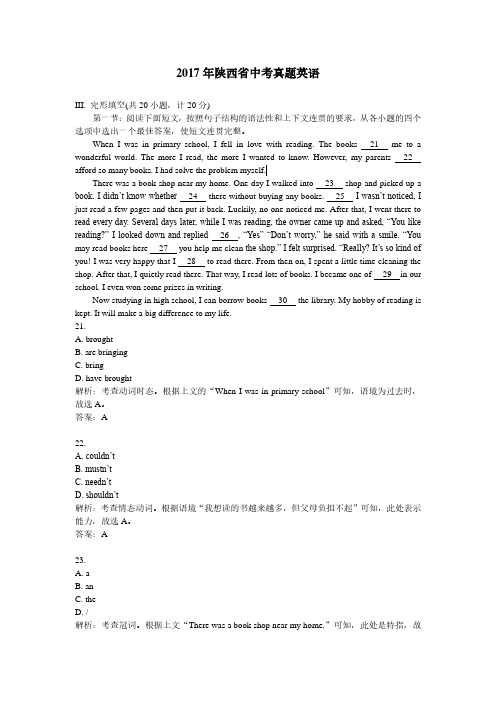2017陕西中考介词
2017年陕西中考英语试卷(含解析)

2017陕西中考英语试卷第I卷(共65分)听力部分A卷I.听对话,选答案(共15小题,计15分)(2017·陕西) 第一节:听下面10段对话,每段对话后有一个问题,读两遍,根据每段对话的内容和后面的问题,从所给的三个选项中选出最恰当的一项。
1. A. A pencil. B. A ruler. C. A knife. 【B】2. A. A blue one. B. A white one. C. A black one.【C】3. A. It’s snowy. B. It’s cloudy. C. It’s sunny.【A】4. A. America. B. China. C. England. 【B】5. A. She’s going to write an article.【A】B. She’s going fishing.C. She’s going to do housework.6. A. By bike. B. By car. C. By bus. 【A】7. A. Behind the library. 【C】B. Across from the dining hall.C. Beside the dining hall.8. A. English. B. Math. C. Chinese. 【C】9. A. For 45 minutes. B. For 15 minutes. C. For 30 minutes. 【B】10. A. She was heavy. B. She was thin. C. She was short. 【A】1-5 BCABA 6-10 ACCBA(2017·陕西)第二节:听下面两段对话,每段对话后有几道小题,请根据每段对话内容和后面的问题,从所给三个选项中选出最恰当的一项,每段对话读两遍。
听第11段对话,回答第11、12小题。
2017陕西中考英语试卷分析

2017陕西中考英语试卷分析2017陕西中考也结束了,放松心情,去迎接中考过后的生活吧,下面由店铺给大家整理了2017陕西中考英语试卷分析,希望可以帮到大家!2017陕西中考英语试卷分析Ⅰ&Ⅱ.听力本次考试是陕西中考改革第一年,但听力变化不大。
结合近五年中考听力,“交通工具”“颜色”“时间”“天气”一直是听力中的高频话题考点。
第一大题第一节听对话,交通工具在近五年出现三次之多,所以,对于2018年的考生而言,这几类话题无疑是必须掌握的知识考点。
第二节听力题自2014年以来一直采用三段对话,分别回答两道、三道、五道问题的数量递增模式。
对话主要以人物事件类为主,且题干中的问题基本均为以who, what, how, why, when where提问的特殊疑问句, 故在考试中,学生能够具备快速根据这些关键词找到关键点的答题技巧变得尤为重要。
听力第二大题跟以往中考试题一样,是听力中难度最高的一篇,今年采用的是一篇广告。
本段对话问题覆盖多维度,包括时间,地点,做什么等细节题。
大大响应了从知识到能力的符合学生语言认知的命题方向。
Ⅲ.完型填空第一节:阅读下面的短文,根据句子结构的语法性和上下文连贯的要求,选择最佳答案。
从16年下半年确定中考英语取消单项选择,用一篇完型填空代替存在。
孩子们就一直期待着揭开这个“新”题型的美丽面纱。
今年完型第一节以一篇记叙文登场,文章描写了一个痴迷读书的孩子因为父母无法负担巨大的书费,自己选择去书店“蹭书”被店主抓到,店主向孩子提供了以打扫店内卫生交换免费读书的机会。
故事的最后主人公感叹到如今高中可以在图书馆借书看,并且认为书真的可以给我们的生活带来巨大变化。
文章通篇以第一人称为主,按照时间发展顺序记叙,并加入作者感受,不断推动故事发展。
整篇故事发生在过去,所以时态上以一般过去时为主,填空处大多数考点都在考查单独语法点的基础上加上了一般过去时,希望考生答卷时不要忘记将填入的单词变为一般过去时才好。
2017年陕西中考英语(参考答案)

2017陕西中考英语试卷第一卷(共65分)听力部分(略)A卷笔试部分Ⅲ.完形填空(共20小题,计20分)第一节:阅读下面短文,按照句子结构的语法性和上下文连贯的要求,从各小题的四个选项中选出一个最佳答案,使短文连贯完整。
When I was in primary school, I fell in love with reading. The books __21__me to a wonderfulworld. The more I read, the more I wanted to know. However, my parents _22_ afford so manybooks. I had to solve the problem myself.There was a book shop near my home. One day I walked into _23_ shop and picked up a book. I didn't know whether _24_there without buying any books. _25_ I wasn’t notice d, I just read a few pages and then put it back. Luckily, no one noticed me. After that, I went there to read every day. Several days later, while I was reading, the owner came up and asked, "You like reading?" I looked down and replied _26_, “Yes." “Don’t worry,” he said with a smile. “You may read books here _27_ you help me clean he shop." I felt quite surprised, “Really? It's so kind of you!” I was very happy that I _28_ to read there. From then on, I spent a little time cleaning the shop. After that, I quietly read there. That way, I read lots of books. I became one of _29_writers in our school. I even won some prizes in writing."Now studying in high school, I can borrow books _30_ library. My hobby of reading is kept. It will make a big difference to my life.21. A. brought B. are bringing C. bring D. have brought22. A. couldn't B. mustn't C. needn’t D. shouldn’t23. A. a B.an C. the D./24. A. can l read B.I can read C. could I read D.I could read25. A. Make sure B. To make sure C. Believe in D. To believe in26. A. nervous B. nervously C. angry D. angrily27.A. if B. although C. before D. unless28.A will allow B. will be allowed C. allowed D. was allowed29.A. good B. the best C. poor D. the poorest30.A. to B. for C. with D. from第二节:阅该下面一篇短文,理解大意,然后从各小题的四个选项中选出一个最佳答案,使短文连贯完整。
2017年陕西中考英语真题、参考答案

2017陕西中考英语试卷第一卷(共65分)听力部分(略)A卷笔试部分Ⅲ.完形填空(共20小题,计20分)第一节:阅读下面短文,按照句子结构的语法性和上下文连贯的要求,从各小题的四个选项中选出一个最佳答案,使短文连贯完整。
When I was in primary school, I fell in love with reading. The books __21__me to a wonderful world. The more I read, the more I wanted to know. However, my parents _22_ afford so manybooks. I had to solve the problem myself.There was a book shop near my home. One day Iwalked into _23_ shop and picked up a book. I didn't know whether _24_there without buying any books. _25_ I wasn’t noticed, I just read a few pages and then put it back. Luckily, no one noticed me. After that, I went there to read every day. Several days later, while I was reading, the owner came up and asked, "Youlike reading?" I looked down and replied _26_, “Ye s." “Don’t worr y,” he said with a smile. “Y ou may read books here _27_ you help me clean he shop." I felt quite surprised, “Rea lly? It's so kind of you!” I was very happy that I _28_ to read there. From then on, I spent a little time cleaning the shop. After that, Iquietly read there. That way, I read lots of books. I became one of _29_writers in our school. I even won some prizes in writing. "Now studying in high school, I can borrow books _30_ library. My hobby of reading is kept. It will makea big difference to my life.21. A. brought B. are bringing C. bring D. havebrought22. A. couldn't B. mustn'tC. needn’tD. shouldn’t23. A. a B.an C. theD./24. A. can l read B.I can readC. could I readD.I could read25. A. Make sure B. To make sure C. Believe in D. To believe in26. A. nervous B. nervously C. angry D. angrily27.A. if B. although C. before D. unless28.A will allow B. will be allowed C. allowed D. was allowed29.A. good B. the best C. poor D. the poorest30.A. to B. for C. withD. from第二节:阅该下面一篇短文,理解大意,然后从各小题的四个选项中选出一个最佳答案,使短文连贯完整。
2017年中考英语语法专题详解三

介词、连词 ⼀. 介词 1. 介词概述:介词表⽰它与后⾯的名词或代词与其他句⼦成分的关系。
介词是虚词,不能单独做句⼦成分。
介词在英语中⽤法很活,也⽆⼀定规律可循。
在初中范围内还应学⼀个记住⼀个,特别是那些和动词的特殊搭配。
2. 常⽤介词的意义和⽤法。
⑴时间或地点介词in、on、at的⽤法区别: 表⽰时间时, in表⽰在⼀段时间⾥(在将来时句⼦中则表⽰在⼀段时间之后), on表⽰在具体的某⼀天或者某天的上下午等, at 表⽰在某个时刻或者瞬间; 表⽰地点时, in表⽰在某个范围之内, on表⽰在某个平⾯上或与⼀个⾯相接触,at则表⽰在某个具体的场所或地点。
如: He was born on the night of May 10th. I usually get up at 7:00 in the morning. His glasses are on the desk. My brother is at the bus stop. ⑵ after与in表⽰时间的⽤法区别:“after+(具体时刻/从句)”表⽰“在…时刻之后”常⽤于⼀般过去时态;“in+(⼀段时间)”表⽰“在(多久)之后”,常⽤于将来时态。
如: He said that he would come back after 6:00. My father is coming back from Astralia in about a month. ⑶ since与for表⽰时间的⽤法区别:“since+(具体时刻/that-从句)”表⽰“⾃从…起⼀直到现在”,“for +(⼀段时间)”表⽰“持续⼀段时间”,都常⽤于完成时态;如: My father has worked in this factory since 1970. My father has worked in this factory for over 30 years. ⑷ by、in与with表⽰⽅式的⽤法区别:都可以表⽰“⼯具、⼿段”,但是by主要表⽰“乘坐”某个交通⼯具或“以……⽅式”,在被动句中可以表⽰动作的执⾏者;in表⽰“使⽤”某种语⾔/⽂字,with表⽰“使⽤”某个具体的⼯具、⼿段。
2017年陕西省中考真题英语

第二节:阅读下面一篇短文,理解大意,然后从各小题的四个选项中选出一个最佳答案, 使短文连贯完整。
Andrew was a smart boy. He was interested in different things. He like doing things in a way that he thought to be clever. But sometimes he made wrong choices.
22. A. couldn’t B. mustn’t C. needn’t D. shouldn’t 解析:考查情态动词。根据语境“我想读的书越来越多,但父母负担不起”可知,此处表示 能力,故选 A。 答案:A
23. A. a B. an C. the D. / 解析:考查冠词。根据上文“There was a book shop near my home.”可知,此处是特指,故
33. A. refused B. forgot C. remember D. realized 解析:动词的辨析。语义:当他到家时,他的父亲马上意识到 Andrew 做了什么。根据下文 “He knew his son didn’t buy the right fish.”可知,父亲很了解自己的儿子。分析选项 A. refused 拒绝;B. forgot 忘记;C. remember 记起;记得;D. realized 意识到;根据语境和意思可知, 最恰当的答案应是 D。 答案:D
28. A. will allow B. will be allowed C. allowed D. was allowed 解析:考查时态及语态。首先此处是宾语从句,主句过去时,从句亦应使用过去时,有因为
陕西西安初中英语常用语法知识——介词知识点复习
一、选择题1.—Must I start now?—No, you_______________.A.mustn't B.can't C.needn't D.must C解析:C【解析】【分析】【详解】句意:——我必须现在开始吗?——不,你不必了。
本题考查情态动词。
mustn't禁止,can’t不可能,needn’t不必,must必须。
Must I…?“我必须……吗?”其肯定回答为Yes, you must.否定回答为No, you needn’t.或you don’t have to.故选C。
2.You have finished most of the work, so you ____ start working so early tomorrow. You may come at 9 :00.A.can't B.mustn't C.needn't D.couldn't C解析:C【解析】【详解】句意:你已经完成了大部分工作,所以你明天不必这么早就开始工作。
你可以9点来。
本题考查情态动词。
can't不可能,mustn’t禁止,needn’t不必,couldn’t可能不。
根据You have finished most of the work可知,你已经完成了大部分工作,因此明天不必这么早就开始工作,因此用needn’t,故选C。
3.―I didn’t pass the driving test again.―Don't worry. Just like the weather, life be beautiful all the time.A.can't B.needn't C.shouldn't D.mustn't A解析:A【解析】【详解】句意:——我驾照考试又失败了。
——别担心。
2017陕西中考英语试题及答案
2017陕西中考英语试题及答案一、听力测试(共30分)第一节(共5小题;每小题2分,满分10分)听下面5段对话。
每段对话后有一个小题,从题中所给的A、B、C 三个选项中选出最佳选项,并标在试卷的相应位置。
听完每段对话后,你都有10秒钟的时间来回答有关小题跟阅读下一小题。
每段对话仅读一遍。
1. What do we know about Tony?A. He is coming back home soon.B. He will stay in New York for a year.C. He is leaving for New York on Friday.2. What is the man going to watch?A. A movie.B. A TV program.C. A basketball game.3. What is the weather now?A. Rainy.B. Cloudy.C. Snowy.4. Where does this conversation probably take place?A. In a library.B. In a hotel.C. In a bookstore.5. What does the woman want the man to do?A. Help her with her math.B. Write an article for the magazine.C. Teach a math class to some students.第二节(共10小题;每小题2分,满分20分)听下面4段对话或独白。
每段对话或独白后有几个小题,从题中所给的A、B、C三个选项中选出最佳选项,并标在试卷的相应位置。
听每段对话或独白前,你将有5秒钟的时间阅读每小题。
听完后,每个小题将给出5秒钟的作答时间。
每段对话或独白读两遍。
听第6段材料,回答第6、7题。
2017年陕西中考英语真题、参考答案
2017陕西中考英语试卷Ⅲ.完形填空(共20小题,计20分)第一节:阅读下面短文,按照句子结构的语法性和上下文连贯的要求,从各小题的四个选项中选出一个最佳答案,使短文连贯完整。
When I was in primary school, I fell in love with reading. The books __21__me to a wonderfulworld. The more I read, the more I wanted to know. However, my parents _22_ afford so manybooks. I had to solve the problem myself.There was a book shop near my home. One day I walked into _23_ shop and picked up a book. I didn't know whether _24_there without buying any books. _25_ I wasn’t noticed, I just read a few pages and then put it back. Luckily, no one noticed me. After that, I went there to read every day. Several days later, while I was reading, the owner came up and asked, "You like reading?" I looked down and replied _26_, “Yes." “Don’t worry,” he said with a smile. “You may read books here _27_ you help me clean he shop." I felt quite surprised, “Really? It's so kind of you!” I was very happy that I _28_ to read there. From then on, I spent a little time cleaning the shop. After that, I quietly read there. That way, I read lots of books. I became one of _29_writers in our school. I even won some prizes in writing."Now studying in high school, I can borrow books _30_ library. My hobby of reading is kept. It will make a big difference to my life.21. A. brought B. are bringing C. bring D. have brought22. A. couldn't B. mustn't C. needn’t D. shouldn’t23. A. a B.an C. the D./24. A. can l read B.I can read C. could I read D.I could read25. A. Make sure B. To make sure C. Believe in D. To believe in26. A. nervous B. nervously C. angry D. angrily27.A. if B. although C. before D. unless28.A will allow B. will be allowed C. allowed D. was allowed29.A. good B. the best C. poor D. the poorest30.A. to B. for C. with D. from第二节:阅该下面一篇短文,理解大意,然后从各小题的四个选项中选出一个最佳答案,使短文连贯完整。
2017中考语法口诀记忆中考介词
to 7:00 in the evening. 4._D__ur_i_ng___ the past years, he has worked hard
at English.
时间介词辨析4(in, after, later)
have a rest.
位移介词(across, through, past)
across 从表面穿过 go/ walk across=cross through 从内部穿过 past 经过,路过 go/walk past= pass
1.It’s rather a tough hike to walk _a_cr_o_s_s__ the desert within 3 days.
1. You can improve English _b_y__ reading more. 2. He wrote the letter __w_it_h__ a pen. 3.He talked to his father __o_n/_o_v_e_r_ the phone. 4.They talked ___in____ a loud voice. 5. You must say that ___in__ English.
in + 一段时间(用于一般将来时) after + 一段时间(用于一般过去时) after + 点时间(常用于一般将来时) 一段时间+ later
1.He came back __af_t_e_r_ half an hour. 2.Lucy will go out _i_n_ half an hour. 3.They will visit her _a_f_t_e_r __ Friday. 4.Our teacher will be back three months _la_t_e_r. 5. –Frank, when will the short meeting begin?
- 1、下载文档前请自行甄别文档内容的完整性,平台不提供额外的编辑、内容补充、找答案等附加服务。
- 2、"仅部分预览"的文档,不可在线预览部分如存在完整性等问题,可反馈申请退款(可完整预览的文档不适用该条件!)。
- 3、如文档侵犯您的权益,请联系客服反馈,我们会尽快为您处理(人工客服工作时间:9:00-18:30)。
中考介词专项一、介词的功能介词是一种虚词,用来表示名词或相当于名词的其它词语句中其它词的关系,不能单独使用。
介词可与名词或相当于名词的其它词构成介词短语。
介词短语可在句中作定语,状语,表语和宾语补足语。
例如:The boy over there is John’s brother. (定语)The girl will be back in two hours. (状语)Our English teacher is from Australia. (表语)Help yourself to some fish. (宾语补足语)二、常用介词的用法辨析(1)表时间的介词1)at, in on表示时间点用。
例如:at six o’clock, at noon, at midnight。
表示在某个世纪,某年,某月,某个季节以及早晨,上午,下午,晚上时,用。
例如:in the nineteenth century, in 2002, in may, in winter, in the morning, in the afternoon等。
表示具体的某一天和某一天的上午,下午,晚上时,用。
例如:on Monday, on July 1st, on Sunday morning等。
2)since, after由since和after 引导的词组都可表示从过去某一点开始的时段,但since词组表示的时段一直延续到说话的时刻,因而往往要与时态连用。
而after词组所表示的时段纯系过去,因而要与与时态连用。
【活学活用】I haven’t heard from him last summer.five days the boy came back.3)in, after在将来时态中,in与连用时,表示“过多长时间以后”的意思。
After后面只能跟表示的词语。
After与过去时态连用时,后面才能跟表示一段时间的词语。
例如:【活学活用】He will be back two months.He will arrive four o’clock.He returned a month.(2)表示地点的介词1)at, in, onat一般指;in一般指或;on表示【活学活用】He arrived Shanghai yesterday.There is a big hole the wall.The teacher put up a picture the wall.2)over, above, onover, on和above都可表示“在……上面”,但具体含义不同。
Over表示位置高于某物,在某物的正上方,其反义词是。
above也表示位置高于某物,但不一定在正上方,其反义词是。
On 指两个物体表面接触。
【活学活用】There is a bridge the river.We flew the clouds.3)across, throughacross和through均可表示“从这一边到另一边”,但用法不同。
Across的含义与on有关,表示动作在进行。
Through的含义与in有关,表示动作是在进行。
【活学活用】The dog ran the grass.The boy swam the river.They walked the forest.4) in front of, in the front ofin front of表示“在某人或某物的前面”,在某个范围;in the front of 表示“在……的前部”,在某个范围。
【活学活用】There are some tall trees the building.The teacher is sitting the classroom.5)in,on,toin表示在某一范围内,该范围,on表示与某地,to表示在某一范围,不属于该范围。
【活学活用】China is the east of Asia.Shandong is the east of Shanxi.Russia is the north of China.6) between ,aamongbetween表示在,among表示在。
(3)表示方式的介词1)by, with, inby 常指乘,或by doing sth 。
with 常指用某种工具。
in 常指用…...方式,用…...语言,用......材料等;【活学活用】He used to go to school bus , but now he gets used to walking .We each see something our eyes .We often write ink .(4)易混淆的介词except, besides除…之外(不包含在整体范围之内);除…之外(包括在整体范围内)。
【活学活用】Mr. Wang, we went to see the film.Mr. Wang, we also went to see the film.三. 介词的固定搭配介词往往同其他词类形成了固定搭配关系。
记住这种固定搭配关系,才能正确使用介词。
(1)介词与动词的搭配listen , laugh , get , look ,wait , hear , turn , worry , think , spend……等。
(2)介词与名词的搭配on time, in time, by bus, on foot, with pleasure, on one’s way to, in trouble, at breakfast, at the end of, in the end等。
(3)介词与形容词的搭配be late , be afraid be good , be interested , be angry , be full , be sorry 等。
随堂练习一.用适当的介词填空1. ---How are you going to the train station to meet your aunt?---I’m going there _______ my car.2. Mum, today is Mother’s Day. Mike and I want to invite you to have dinner _____ us at Zhonglou Restaurant.3. Hangzhou is famous ______ the West Lake.4. Today some newly-produced mobile phones can take pictures ______ a camera.5. Could you tell me if there is a flight to the capital ______ March, 25th?6. We a ll agree ______ you. Let’s start at once.7. There is a big shop ______ the other side of the road.8.---Which necklace have you lost?---The one you gave me _____ my birthday.9. You should take more exercise. It’s good ______ your health.10. It is clear that fish cannot live _______ water.四完型填空(1)A very new, yung officer was at a railway station. He was on his way to visit his mother in 1 town. He wanted to telephone her to tell her the time of his train, 2 she could meet him at the 3 in her car. He looked at all his pockets, but 4 that he did not have the right money for the telephone, so he went on and looked 5 for someone to help him. At last an old soldier came by, and the young officer stopped him and said, “Can you change the money 6 me?”“Wait a moment,” the soldier 7 , and he began to put his hand in his 8 “I’ll see whether I can help you.”“Don’t you know how to speak to an officer?” the young officer said angrily “Now let’s 9 again, Can you change the money for me?”“No, sir,” the old soldier answered 10 .1.A.other B.the other C.another D.one2.A.so B.so that C.because D.when3.A.place B.station C.street D.stop4.A.knew B.thought C.found D.found out5.A.up B.down C.around D.into6.A.to B.with C.for D.and7.A.answered B.spoke C.told D.smiled8.A.coat B.handbag C.wallet D.pocket9.A.start B.to begin C.doing D.ask10.A.easily B.fast C.happily D.quickly(2)One of Charlie Chaplin’s most famous films was “The Gold Rush” The film was set in California in the middle of the 1 century. At that time, gold was discovered in California and thousands of people 2 there to look for gold, so it became 3 as “the gold rush” People said gold co uld 4 be picked up by washing sand from the river in a pan of water. This was known as “panning for gold”In the film, Chaplin and his friend are in California. So far, they have been 5 in their search for gold and have no money at all. They 6 in a snow storm in a small wooden house. They have 7 They are so hungry that they 8 a pair of shoes, by boiling them in a pan of water. Chaplin sits down 9 the table and eats the shoe. He makes it seem as if this is one of the 10 meals that he has ever enjoyed.1.A.nineteen B.ninetieth C.nineteenth D.ninth2.A.went B.left C.climb D.found3.A.famous B.known C.wonderful D.great4.A.hard B.easily C.difficulty D.slowly5.A.unhappy B.unsuccessfully C.unlucky D.unluckily6.A.have got B.meet C.are caught D.live7.A.a little food B.some water C.nothing D.nothing to eat8.A.wear B.cook C.make D.mend9.A.at B.by C.near D.beside10.A.biggest B.dearest C.cheapest D.most delicious。
